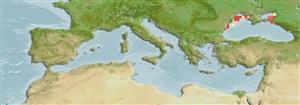Common names from other countries
>
Clupeiformes (Herrings) >
Alosidae (Shads and Sardines)
Etymology: Alosa: Latin, alausa = a fish cited by Ausonius and Latin, halec = pickle, dealing with the Greek word hals = salt; it is also the old Saxon name for shad = "alli" ; 1591 (Ref. 45335).
Environment: milieu / climate zone / depth range / distribution range
экология
морской; пресноводный; солоноватоводный; анадромный (Ref. 51243). Temperate; 48°N - 37°N, 27°E - 54°E
Eurasia: Black Sea, Sea of Azov and Caspian Sea.
Size / Вес / Возраст
Maturity: Lm ? range ? - ? cm
Max length : 32.0 cm TL самец/пол неопределен; (Ref. 593); common length : 20.0 cm SL самец/пол неопределен; (Ref. 188); наибольший вес (опубликованные данные): 250.00 g (Ref. 593); наибольший возраст (опубликованны данные): 7 годы (Ref. 10549)
колючие лучи спинного плавника (общее число) : 0; колючие лучи анального плавника: 0. Body `shad-like', usually rather deep and compressed. Total gill rakers 50 to 180, long and thin, distinctly longer than filaments. Teeth poorly developed in jaws, sometimes barely detectable. A black spot posterior to gill opening and occasionally further black spots on flank in some cases.
Schooling and migratory (Ref. 188); at sea, pelagic in coastal waters with steady current and avoids areas with stable salinity; migrates from sea to mouth of large rives and spawns in fresh- or slightly brackish-water at shallow sites washed by flow of large rivers. Males migrate upriver at 2-3 years, females at 4-5; many individuals reproduce 2-4 seasons. Two migration peaks, one in late April (mostly males), one in early May (mostly females), entering rivers when temperature rises above 10°C. Spawns when temperature is at least 15°C, in May to June. Spawning usually occurs in the upper 3 m. Eggs semi-pelagic and demersal. Spent fish migrate back to the sea; juveniles migrate to sea during first summer, remaining there until they mature. Feeds mainly on zooplankton (copepods and mysids) when at sea (Ref. 59043). Depending on the subspecies (10 subspecies known), some are semi-anadromous and spawn in fresh or slightly saline waters, mainly in the lower reaches, whereas others are practically marine and spawn in brackish or even fully saline oceanic waters. One of the most warm-loving Alosa of the Caspian. Only A. a. caspia of the Caspian Sea is of commercial importance (Ref. 188).
Depending on the subspecies some are semi-anadromous and spawn in fresh or slightly saline waters, mainly in the lower reaches, whereas others are practically marine and spawn in brackish or even fully saline oceanic waters (Ref.188).There are two migration peaks, one in late April (mostly males) and one in early May (mostly females). Spent fish migrate back to sea. Juveniles migrate to sea during first summer, remaining at sea until they mature (Ref. 59043).
Whitehead, P.J.P., 1985. FAO Species Catalogue. Vol. 7. Clupeoid fishes of the world (suborder Clupeoidei). An annotated and illustrated catalogue of the herrings, sardines, pilchards, sprats, shads, anchovies and wolf-herrings. FAO Fish. Synop. 125(7/1):1-303. Rome: FAO. (Ref. 188)
Статус Красного Списка МСОП (Ref. 130435)
CITES (Ref. 128078)
Not Evaluated
Угроза для людей
Harmless
Использование человеком
рыболовство: важный объект промысла
дополнительная информация
инструменты
Специальные отчеты
Скачать в формате XML
ресурсы в Интернет
Estimates based on models
Phylogenetic diversity index (Ref.
82804): PD
50 = 0.5000 [Uniqueness, from 0.5 = low to 2.0 = high].
Bayesian length-weight: a=0.00891 (0.00591 - 0.01344), b=2.97 (2.85 - 3.09), in cm Total Length, based on LWR estimates for this species & Genus-body shape (Ref.
93245).
Trophic level (Ref.
69278): 3.5 ±0.46 se; based on food items.
устойчивость к внешним воздействиям (Ref.
120179): средний (среднего размера), минимальное время удвоения популяции 1.4-4.4 года (tmax=7).
Fishing Vulnerability (Ref.
59153): Low to moderate vulnerability (34 of 100).
